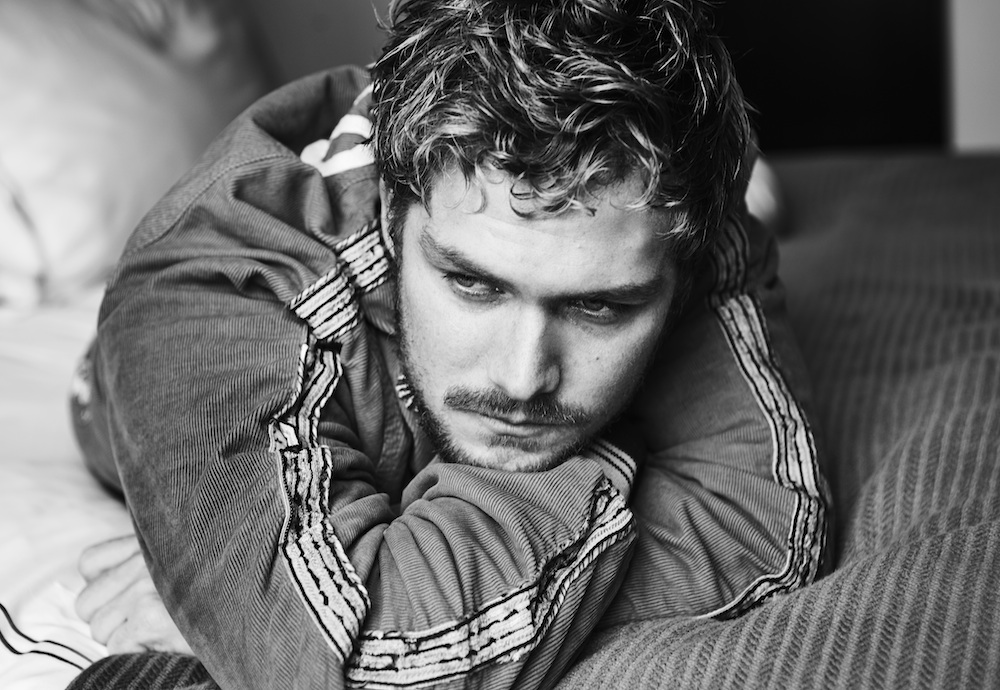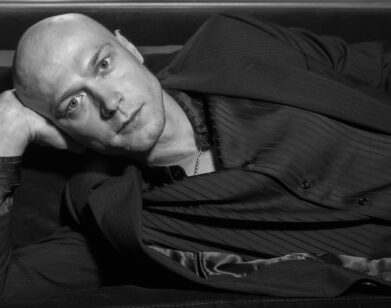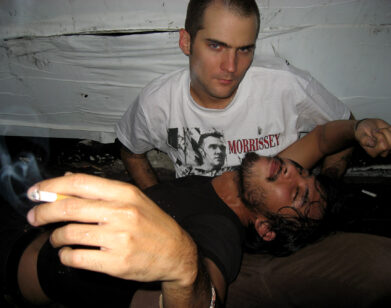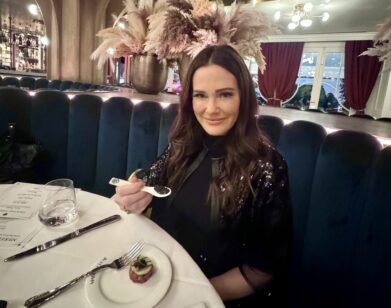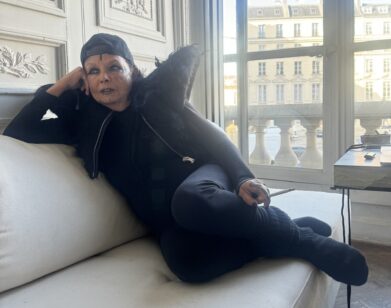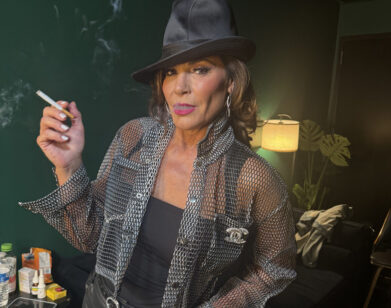Finn Jones
FINN JONES AT THE VICEROY CENTRAL PARK NEW YORK, FEBRUARY 2017. PHOTOS: DAVID NEEDLEMAN/JONES MANAGEMENT. STYLING: JOSHUA LIEBMAN/HONEY ARTISTS. GROOMING: LAURA DE LEON/JOE MANAGEMENT USING CHANEL. RETOUCHING: FEATHER CREATIVE.
When Finn Jones first heard about Iron Fist, Marvel and Netflix’s fourth series leading up to The Defenders, he was at the airport. The British actor had just wrapped his final scene as Loras Tyrell, the battered former “Knight of the Flowers,” on HBO’s Game of Thrones, and was waiting to fly home. “It was pretty scary,” the 28-year-old recalls. “After having a job for six years, to not have anything, it’s overwhelming and daunting. I was at the stage in my career where it was now or never,” he continues. “Thrones was great, but it was a recurring guest star. For my career, I wanted to get a series regular … I never imagined I’d get a lead.”
The role—that of protagonist Danny Rand, the heir of Rand Enterprises who mysteriously reappears 15 years after his suspected death in a plane crash—resonated instantly with Jones. “I remember just sitting there and thinking, ‘Fuck, this is the one.’ It was a deep feeling,” he says. “I was really into Danny’s more spiritual side, his strength, and the fact that he was a hero, but a troubled hero. All of those things fitted with where I was in my life.”
After a few rounds of auditions and screen tests, Jones had signed up for over a year of continuous work in New York City. Tomorrow, the first season of Iron Fist will drop via Netflix. When we meet Jones in person, he is still working on The Defenders, which will unite the separate threads of Daredevil, Jessica Jones, Luke Cage, and Iron Fist. “Since March last year, I’ve been working balls-to-the-wall,” he explains. “It’s had its ups and downs. It’s a real test of endurance, but creatively, it’s really great to be able to go on an intense journey with the character for such a long amount of time—to really stay plugged-in.”
EMMA BROWN: I’m curious about the “lost year in Ibiza” you mentioned during the shoot.
FINN JONES: Oh yeah. When was that? 2014? 2013? It might’ve been across both of them. Lots of floral Hawaiian shirts and beaches. I’m a big music fan, and it’s close to London—you can get an EasyJet flight there for, like, the equivalent of 60 dollars return. It just made sense to go over there, get some sun, dance to some music, relax. With Thrones, because it was an ensemble piece and it only filmed for six months of the year, I actually had a lot of free time. I’d only be working maybe six to seven weeks out of the year, and the rest of the year I was attending Comic Cons, traveling, going to Ibiza. I had a lot more free time doing Game of Thrones than I did [with Iron Fist]. This show, I have no free time. It’s just this.
BROWN: Do you come from a creative family?
JONES: No. My mum was a child minder, but now she fosters. My dad was in the police force and now he’s a private detective. I can’t really say too much. It’s pretty top secret. I’ve probably said too much by saying that.
BROWN: You can give Jessica Jones some tips.
JONES: I could. That would be fun.
BROWN: As a five-year-old, what did you want to do when you grew up? Do you remember?
JONES: Here’s the funny thing. I don’t know if it was a memory or an early dream or something like that—where this memory came from, it’s hazy—but one of my earliest memories is of being in a stroller, and my mum is above me with her friend. I’m looking up at my mum and her friend talking to each other, and in the clouds, I see this pirate ship floating by—sailing by—in the sky. I’m like, “Mum, Mum. Look at the pirate ship! It’s in the sky! Can you see it, Mum?” She looks at me funny, like, “What the fuck are you talking about?” And turns to her friend and goes, “That kid is going to make some actor one day.” That impression stayed in my mind ever since. At first I didn’t know what an actor was, I thought it was an acrobat. I saw acrobats at the circus and I thought that was interesting. In my head, that was what I imagined I wanted to be when I grew up. Then I realized what an actor was, and I’ve gravitated to it ever since. It’s strange because I’ve never really enjoyed being in the limelight. My parents aren’t from a theatrical background. It isn’t even that my parents grew up watching lots of films and television shows and I watched that and was like, “Ah, that’s what I want to do when I’m older.” It was something a lot more abstract and a lot more subconscious. I don’t understand.
BROWN: When you read Iron Fist, then, is that something that stood out—that Danny wanted to be an acrobat too?
JONES: Actually, I didn’t even realize that. Just thinking about that now, that’s another weird synchronicity, which has kind of collided on this journey.
BROWN: Is that what you want in a character—someone who feels similar to you? Or do you want someone completely different?
JONES: I think every actor is different. For me, when you’re playing a character on television for so long—hopefully this will be for a good couple of years; Game of Thrones was six years—you really want that character to coincide with your own personal growth. So yes, I was looking for a character that was in a similar place to where I was in my life—turning from a young man into a man and that naïve optimism. For me as an actor, I find it’s most creative when I’m bringing myself into the role rather than putting the role on. I feel like it’s more of a cathartic experience.
BROWN: When did you make the decision to go to drama school?
JONES: I think I was in sixth form. I was studying photography, media, English lit, drama, and film studies, and it was just this thing that was in me. I was doing the school plays and it was something that I really enjoyed. I’ve always felt a bit like an outsider, and it was when I was doing theater that I managed to find some cohesiveness and focus and enjoyment. I could experiment with myself in that space. So I thought, “Fuck it. Let’s do drama school.” It was never a conscious decision, it was always a path that I was on and there was no second thought to it. I remember teachers saying to me, “Are you sure you want to do this? Maybe going to university and getting a degree is a better idea. You know not a lot of actors actually work.” All that kind of stuff. And I remember just being very, very stubborn in my belief that I was going to follow this through and everything would be okay. I knew what I wanted to do and I was going to do it.
BROWN: Did you get an agent right away?
JONES: I did. I was the first actor out of my year to get an agent, to much of my peers’ envy. In the third year of drama school, you do plays and showcases to the public and agents come and see you. My first ever performance in my third year, I was playing Lysander in A Midsummer Night’s Dream, and I got picked up from that. By the time the showcase came out, which is the big event where you do monologues, I already had an agent and I’d already booked a job, [the television series] Hollyoaks. It’s not the most celebrated of cultural television projects, but for a young actor coming out of drama school, it’s a great stepping-stone and learning ground to hone in your craft.
BROWN: It’s a crash course.
JONES: It’s a total crash course. I was there for six months, which was the perfect amount of time. After that, I did a Doctor Who spinoff, The Bill, Doctors—all those standard television shows where you get your stripes. About a year after leaving drama school or a year and a half—and I was working solidly ever since leaving drama school—I picked up Game of Thrones.
BROWN: Did you know what Game of Thrones was going to be like that first season?
JONES: I knew it was an HBO show, so I knew it was going to be big, but if you’d have told me the day I got cast that I’d be on that show for six years, that that show would allow me to travel the world, that it was going to become such a huge cultural phenomenon as it has done—I don’t think anybody working on that show could possibly have envisioned the success it has gone on to have. Shows like that, stories like that, only really come around once every 10, 15 years. I can’t remember the last time a show has really caught the imagination that way. Maybe Star Wars back in the ’70s. It was a mad, mad trip being on that show for six years. Everyone was really tight. I made some friends on that show that will be friends for life. I’m very grateful to the show for bringing such an amazing group of people together.
BROWN: Is there anyone in the cast that you never met?
JONES: I pretty much met everyone. I was lucky, because I got to work with a lot of different actors, but also you meet everyone at press events, Comic Cons, table reads. By the end of the six years, there wasn’t a single person I didn’t know. And everyone was fucking amazing. Everyone was nice; everyone was humble. Everyone was really solid, really good people.
BROWN: When did you get to meet the rest of The Defenders?
JONES: I did Iron Fist from March until October, six months of an intense schedule. We we’re trying to do movie-scale television on a TV time frame and budget, so you’re run dry. [By the end,] we’d been filming solidly for the last two weeks, all night shoots, and the last day, we were pushing time. Say we started at 4 P.M. on the Friday, we didn’t finish until Saturday at 10 A.M. Then, at noon, I had to go to New York Comic Con to announce to the world this show that I’d just finished making. I was fucking bamboozled. I turned up to Comic Con, little-to-no sleep, terrified, excited, and completely exhausted. The surprise was that all of The Defenders were going to be there, and they were going to come out on stage after we did our panel, and then Sigourney Weaver was going to come out and she was going to be announced as the baddie. I was kind of at the center of all of this, and I remember just thinking, “What the fuck have I let myself into?” It was a whirlwind of craziness. I got there and got thrown on a stage, thousands of fans screaming and going crazy. They were showing the trailer for the first time, and I was seeing myself back in the role for the first time ever in front of thousands of people. Everything was a huge, chaotic blur. At the end of that panel, they invited out Charlie [Cox], Krysten [Ritter], and Mike [Colter]. I’d never met them before in my life, and suddenly we were all sharing a stage. Then Sigourney Weaver came out! And I went home and slept for days.
BROWN: I’m surprised you were able to fall asleep at all after that.
JONES: Yeah, adrenaline kicks in. I remember afterwards, I got back to my neighborhood, and I couldn’t sleep, so I went out to a Thai restaurant, had a quiet meal by myself, drank a beer, and was just like, “Finn. You’re in some heavy shit right now. Brace yourself.”
BROWN: Did you have moment where, after you were announced as Danny, your social media following sky-rocketed?
JONES: Following? I don’t know. I don’t pay attention to how many followers I have. But I did recognize that there was a lot of noise. I try to not listen to the hype. I think being on a show like Game of Thrones for six years, I’ve gone through that whole hype thing, and I know that it doesn’t do you any good creatively. You’ve just got to stay focused on the character and the script and your work. As humble and as grateful as I am for so many people watching it, and that there’s so much love and attention, it’s best for my own sanity and creativeness to try and keep that at bay. It’s a fine line. You’ve really got to learn to balance it, because it can consume you.
SEASON ONE OF IRON FIST WILL BE AVAILABLE FROM TOMORROW, MARCH 17, VIA NETFLIX.

